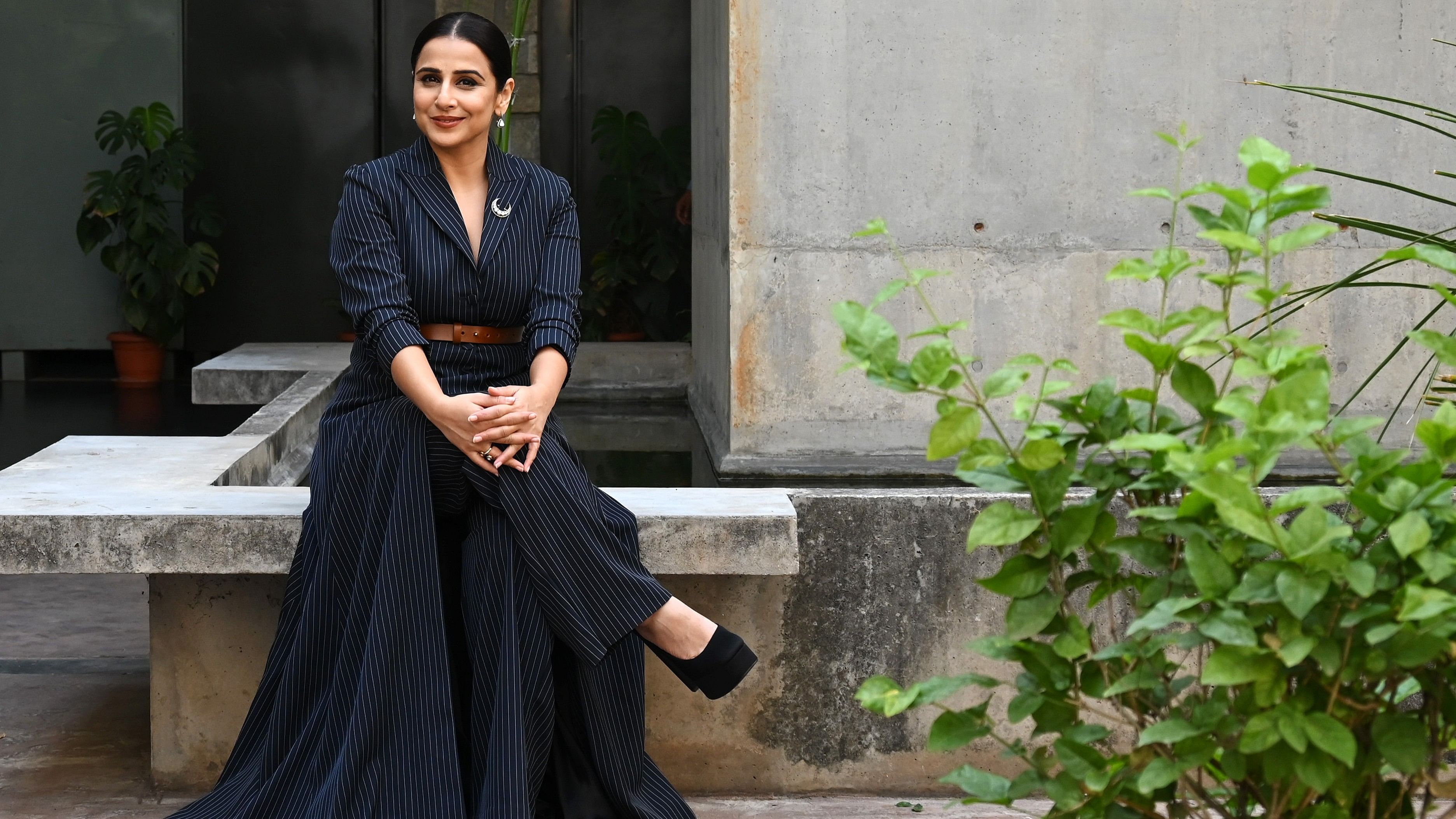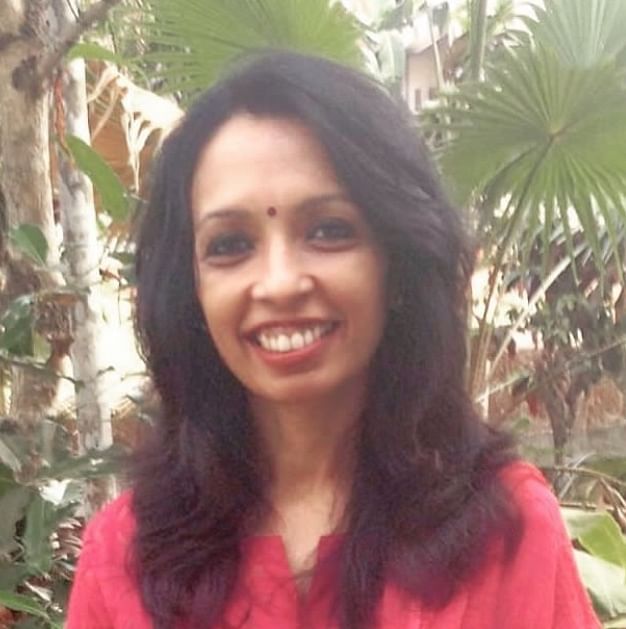
Vidya Balan at Deccan Herald.
Credit: DH Photo/ Pushkar V
"It's too short a trip but I have to say I've always loved Bangalore," actor Vidya Balan says as she walks into the Deccan Herald office, looking sublime.
"I have fond memories. My sister used to live here long long ago," she says. "So I've spent a lot of time here."
She's happy to be back in the city. This time to promote her forthcoming film Do Aur Do Pyaar, directed by ad filmmaker Shirsha Guha Thakurta. This is Shirsha's first feature film. Presented by Applause Entertainment and produced by Ellipsis Entertainment, Do Aur Do Pyaar will release on April 19.
As we sit down to talk, Vidya's energy catalyses me-- but then that's real, raw Vidya for you. Her laughter charges up the room.
With a genre-spanning body of work under her belt, Do Aur Do Pyaar is a departure for Vidya. I ask her how unlike it is from her previous films. "I have not done such a light- hearted, fun, romantic film," she reflects delightedly.
"I'm a die-hard romantic, always looking for a nice romantic story to tell. But I think not many people are telling those stories, so I was thrilled when this came my way. It's very colourful, lively, fun, entertaining and naughty, right up my alley," she laughs. "And the music is great."
Her chemistry with the rest of the cast has been special. "We have a nice bunch of actors -- Prateek Gandhi, Ileana (D'Cruz), Sendhil Ramamurthy and other actors," she informs. "They're all professionals and thankfully, we got along well, so that really helped. And we have a very chilled-out director -- Shirsha Guha Thakurta."
Vidya is not your method actor, she's all spontaneity. Remember Silk Smitha in Dirty Pictur' or Manjulika in Bhool Bhulaiyaa, the performances that blew you away?
"Acting is so much about reacting, right?" she asks.
"When you have actors who are good, it ups your game. It did really on this film, I have to say, nothing felt like an effort," she elucidates. "And I had one of my favourite producers, Ellipses Entertainment, which is Tanuj (Garg), Atul (Kasbekar) and Swati."
The actor played the mathematician Shakuntala Devi with ease and grace. But what could be the mathematics in Do Aur Do Pyaar? "You have to watch it when it releases in theatres on April 19 to figure out why is it not Do Aur Do Chaar and is Do Aur Do Pyaar," she laughs.
While your curiosity gets the better of you, Vidya says, "Rest I leave it to your imagination. I'm not going to be Shakuntala Devi and break it down for you."
So what made her pick up this script? "I think the fact that it's the kind of story that I've never heard before, you know,'' she says.
"And when I heard the one line from our producer Swati, I was like, 'What?' That sounds interesting! And of course, then they worked on the script and came back to me with it. And the script had an innate, liveliness, joy and romance to it."
"I love that zone," she smiles. "And I don't get to do that. too often. I do my work seriously, but I'm not a serious person.
The story, Vidya explains is about marriage, romance, and modern relatoinships and all of that. "I felt it was something new."
The actor has always been reinventing herself. Consistent performances have defined her.
Credit: DH Photo/PUSHKAR V
Credit: DH Photo/PUSHKAR V
Credit: DH Photo/PUSHKAR V
I ask if there is a lack of good scripts in Bollywood and whether films are hidden behind the grandeur of sets, but Vidya says, "I think there's never a dearth of good stories."
We're going through a slightly tricky time in the Hindi film industry. Because a lot of our big films haven't worked, people are being conservative about the medium and small-sized films all the more.
"And then when it comes to women-led films, your options narrow down even further," she goes on. "I think it's all that, but it's a phase and we're going to outgrow it, you know, because some of the big films have done stupendously well."
She is quick to point out to a film like 12th Fail which she feels gives so much hope. "Because it was such a fantastically made film, such a fantastic story, so honest, and it just touched a chord with everyone," she says.
"It's really a function of the times and not a dearth of stories. It's just the fear that, 'Oh my God, not knowing what is working or what is not working'. I think that's natural. You know, everyone is tightening their purse strings (laughs)-- producers and platforms. But we'll bounce back sooner than we know,'' she says.
If she's given a line that she does not agree with personally, does she voice it out to the director?
"Oh, most definitely," Vidya says.
"When I don't agree with any thing in the story, I bring it up with the writer, director, if need be, even the producer. But that's at an early stage before I've said 'yes' to the film."
Once she has said yes to the film, is prepping with the director, and personalising lines as a character and if it doesn't feel natural, she works her way through that.
"But if the writer and director are absolutely convinced that this has to be the line, then I will make a way to personalise it because it's been written with a certain thought," she explains. ''If they feel that 'no, you can change it a little bit' or improvise 'in the way you're saying it,' I work around it. But if they feel, 'no, no, this is a line, this is the punch', I need to get that punch. I need to work my way towards that," she elaborates.
Vidya says it's a process and not one way. "I think from the beginning of my career pretty much I've always told people, maybe after the first two or three years, I've been telling people that this doesn't quite work for me. I think it's just feeling that I have the right to voice my opinion,'' she affirms.
"I have as much of a stake in what I'm doing. it's a collaborative medium and I am really the face of the story. So if I'm not convinced, I cannot convince you of what I'm doing."
The pay parity in film industries has been talked about dime a dozen. Has she ever given it a thought?
"Oh, absolutely," she exclaims, "because I've been asked this question millions of times, but I think it is the need of the hour to address that.''
"And I definitely think we are being paid better," she reveals. "For example, in the kind of films I do, the amount of money I get paid in terms of ratio equals the amount of money a man gets paid in a man-centric film.''
''But the budget of that hero-led film is much bigger. So obviously, in absolute terms it is a vast difference,'' she says. "But I think that's why it's very important to see it in terms of ratio and hope that our budgets will increase, which means, you know, we'll do better and better, but we're definitely in a better place now.''.
Has she faced rejection anytime in her professional life?
''Of course!," she emphasises. "Loads. It's part of life."
She traces back to the beginning of her career especially when she went down to Kerala to do her first Malayalam film. "I was doing a film called Chakra with Lal sir, and that film stopped midway and unfortunately and bizarrely, I got labelled 'jinxed' after that," she recollects.
Vidya remembers that she got replaced in a lot of films that she had signed for during the course of the shoot of that film. "That was one big story that I can talk about. But I think, in life, on a day-to-day basis, sometimes you do face rejection but if things have worked out more or less, the small rejections affect you less," she avers.
I ask how she deals with professional rejections. "When a film doesn't work, it is a form of rejection, it is heartbreaking, but I think I talk about it a lot," she says.
"I speak to my closest people about it because it is like a breakup. You repeat the same thing again and again, and I'm figuring 'why? why did it not work?' because everyone's putting so much into a film. But I think I let it out of my system, so by the time I go on to the next film, I'm ready to move on. I think that's very important" she says
"And I work with a healer. So that also gives me a lot of perspective and clarity,'' she adds.
in Bollywood, do you think people are just judged on their looks instead of talent?
"I think in life people are judged by appearance -- by all of us. I cannot claim that I have never done that," she smiles.
"Now, maybe with awareness, I'm learning not to. But it's second nature to us-- human beings. We try to judge another by appearance. So it is a lot of work to reach a stage where you don't. And then we are talking about films, which is a visual medium, right?" she asks.
"So I think you do get judged for it. And I think when that changes in society, it will also change for films. But I also think that women get judged much more severely," she explains.
"And I think the definition of beauty is now expanding, which is great. But otherwise, you had a set body type, for example. I can fully understand why Taylor Swift is such a rage around the world. Because she ticks all your boxes," she bursts out laughing.
"But there is not one kind of beauty. And I think now we are slowly opening up to that."
"I also realised early on in my career that, you know, 'what the hell? I can't change the way I look. I better embrace it because if I don't, no one is going to'. But thankfully for me, you know, people may have different opinions, but I think very highly of myself. That helps," she laughs, in her signature style.
